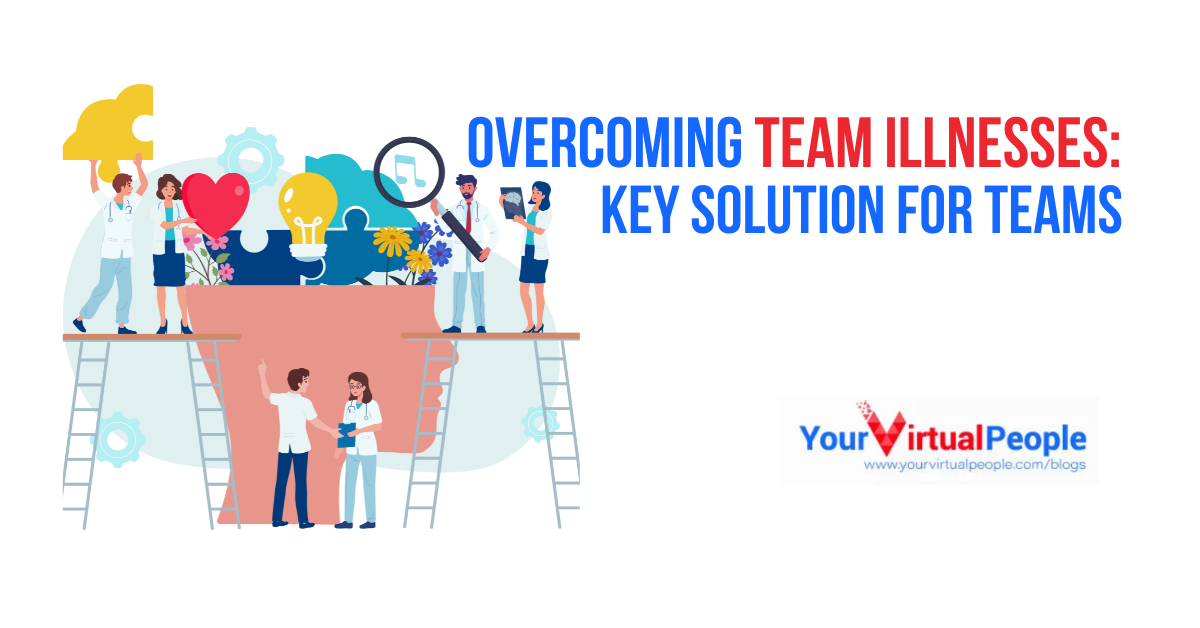Effective team dynamics are critical to corporate success. However, teams can suffer from a variety of “illnesses” and poor habits that reduce production, impair morale, and have an influence on overall performance. Understanding these issues and applying smart solutions may help teams overcome obstacles and thrive. Team illnesses can hinder performance, but overcoming them is the key solution for teams to succeed.
Even unintentional, little gestures from an employer can have a tremendous impact on employees. A simple joke may be misread, and the way feedback is presented may cause more harm than good to employees. Recognizing the impact of every action on the workforce is crucial, regardless of conditions.
Understanding Team Illness and Negative Practices
Procrastination
Example: John consistently delays starting his reports until the last minute. As a result, the team struggles to fulfill deadlines, which leads to rushed work and mistakes.
Why It’s Harmful: Procrastination is generally caused by a fear of failure, a lack of drive, or poor time management. When it becomes a habit, deadlines are missed, and the quality of work suffers.
Bad Behavior
Example: Lisa’s tendency of talking about coworkers causes conflict in the workplace. Other team members avoid working with her, reducing collaboration.
Why It’s Harmful: Negative attitudes, gossip, and a lack of responsibility destroy trust, resulting in a poisonous work atmosphere. This might lead to disagreements and reduce team cohesion.
Poor Communication
Example: A project manager gives the team unclear directions during the handing over of tasks, which results in misunderstandings and redundant work.
Why It’s Harmful: Poor communication can lead to misconceptions and misplaced objectives. It consumes time, money, and causes irritation among team members.
Unreliability
Example: Sarah usually forgets to meet deadlines, which makes others have to take up her slack. This yields irritation and reduces the team’s ability to complete projects on schedule.
Why It’s Harmful: Unreliable conduct disrupts workflow and undermines confidence. It might cause anger and poor teamwork among team members.
Micromanagement
Example: Tom is unable to make judgments since his management is insisted on approving every little element of his job. Tom gradually loses motivation and engagement.
Why It’s Harmful: Micromanagement indicates a lack of trust, stifles innovation, and lowers job happiness, all of which lead to poor performance.
Complacency
Example: The sales staff decides they can coast on prior accomplishments and stops actively chasing new clients after a few profitable quarters.
Why It’s Harmful: Complacency leads to stagnation. Employees who cease looking for ways to improve or innovate perform worse and miss out on possibilities.
Lack of Collaboration
Example: When two departments working on the same project don’t communicate with each other, they end up doing redundant work and running behind schedule.
Why It’s Harmful: When people operate in silos, they miss out on the benefits of collaboration, which can stymie development and undermine team cohesiveness.
Ignoring Feedback
Example: Joe sticks to his old routines, which causes him to lose clients, even though many performance assessments have stressed the need for him to enhance his client interactions.
Why It’s Harmful: Ignoring criticism hinders one’s ability to advance personally and professionally. It results in recurrent blunders and wastes possibilities for improvement.
Burnout
Example: For months, Maria has been putting in sixty hours a week at work. Her performance starts to deteriorate, and she finally takes an extended absence due to burnout.
Why It’s Harmful: Burnout, induced by excessive workloads and a lack of work-life balance, can have a negative influence on employee health, resulting in long-term productivity concerns.
Proven Ways to Overcome Team Illnesses
Foster a Culture of Accountability
Setting clear expectations for both work and actions is critical for fostering an accountable culture. Regular check-ins and monitoring tools, such as project management software, can help ensure that everyone is held accountable for their efforts. For example, utilizing a program to manage individual tasks and deadlines provides accountability and encourages team members to take responsibility for their roles.
Encourage Open Communication
Open communication is critical for preventing misunderstandings and resolving issues quickly. Regular meetings, such as weekly team check-ins, allow everyone to express issues and provide updates on their progress. By providing channels for anonymous recommendations or criticism, team members can interact freely, decreasing uncertainty before it leads to larger difficulties. Overcoming challenges like team illnesses is often the key solution for teams to stay resilient.
Establish Clear Goals and Priorities
Setting clear, attainable goals help to avoid procrastination and keep the team engaged. Breaking down major projects into smaller, more achievable jobs with clear deadlines can help the team stay on track. Prioritizing tasks also ensures that everyone is on the same page and working toward the same goals, which reduces distractions and increases efficiency.
Provide Training and Development
Investing in training programs can help with typical issues such as procrastination or poor time management. For example, providing time management training can help staff be more productive in their activities. Improving team performance and helping them overcome common challenges can be achieved through training in communication and conflict resolution.
Address Issues Early
To avoid escalation, problems must be addressed as soon as they develop. For example, if there is tension among team members, a mediation session can assist address the problem before it impairs the workflow. Addressing concerns immediately and with a problem-solving mentality allows the team to move forward more efficiently, preventing small issues from becoming significant roadblocks. It is vital to understand that team illnesses can hinder performance, but overcoming them is the key solution for teams to succeed.
Encourage Flexibility and Adaptability
Change is inevitable in every business, and cultivating a mentality that encourages flexibility is critical. When establishing new systems or procedures, providing training and assistance allows staff to adjust more seamlessly. For example, when a corporation implements new software, giving training tools and advice during the transition may lessen resistance and enhance overall adaptability.
Addressing Team Illness and Negative Team Members Practices
To maintain a healthy, productive work environment, concerns must be addressed. However, addressing these challenges internally can frequently divert focus away from fundamental corporate objectives. Companies who outsource essential functions to Your Virtual People (YVP) have access to talented experts who bring new insights, excellent work ethics, and a pleasant attitude that improves team chemistry.
Businesses can leverage YVP’s expertise in hiring and managing top offshore talent, alleviating the pressure caused by issues like procrastination or poor communication, while fostering responsibility, efficiency, and adaptability. By using YVP’s skilled offshore professionals, businesses can free themselves from the burden of micromanagement and infuse their teams with fresh perspectives and a high degree of professionalism, which opens the door to more efficient operations and profitable expansion.
Outsourcing to YVP not only helps firms manage workplace difficulties, but it also allows them to focus on strategic growth, resulting in enhanced performance and overall success.
Allow Your Virtual People to be your partner in building a flourishing, happy work environment in which teams cooperate successfully, remain engaged, and consistently meet their goals!
Help is here if you need it, we’ve got your back!
To learn more about our services, visit yourvirtualpeople.com/services/ or book a meeting.



